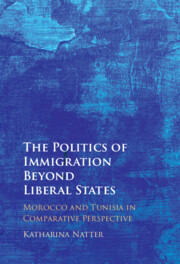Book contents
- The Politics of Immigration Beyond Liberal States
- The Politics of Immigration Beyond Liberal States
- Copyright page
- Dedication
- Contents
- Figures
- Tables
- Acknowledgements
- Note on the Text
- Abbreviations
- 1 Introduction
- 2 Theories on the Move
- 3 The Contrasting Cases of Morocco and Tunisia
- 4 Regime Continuity and Immigration Policy Change in Morocco
- 5 The Illiberal Paradox of Autocratic Policymaking
- 6 Regime Change and Immigration Policy Continuity in Tunisia
- 7 The Ambiguous Effects of Democratization
- 8 Immigration Politics and State Transformation
- 9 Conclusion
- Appendices
- Notes
- References
- Index
5 - The Illiberal Paradox of Autocratic Policymaking
Published online by Cambridge University Press: 12 January 2023
- The Politics of Immigration Beyond Liberal States
- The Politics of Immigration Beyond Liberal States
- Copyright page
- Dedication
- Contents
- Figures
- Tables
- Acknowledgements
- Note on the Text
- Abbreviations
- 1 Introduction
- 2 Theories on the Move
- 3 The Contrasting Cases of Morocco and Tunisia
- 4 Regime Continuity and Immigration Policy Change in Morocco
- 5 The Illiberal Paradox of Autocratic Policymaking
- 6 Regime Change and Immigration Policy Continuity in Tunisia
- 7 The Ambiguous Effects of Democratization
- 8 Immigration Politics and State Transformation
- 9 Conclusion
- Appendices
- Notes
- References
- Index
Summary
Chapter 5 dissects power dynamics among actors involved in immigration policy in Morocco before and after the 2013 reform: the monarchy and administration, international, national, and migrant civil society organizations, as well as international organizations, legal actors, and the private sector. I demonstrate that immigration policy liberalization not only emerged out of Morocco’s autocratic political structures – a dynamic I call the illiberal paradox – but also consolidated them. In particular, I show that the monarchy mobilized the expansion of migrants’ rights, as well as its relations with the administration and an expanding civil society to portray the king as a ‘liberal’ monarch. In this process, legal actors and elected politicians have only played a subordinate role. However, these ‘regime effects’ in domestic politics did not absorb resistances and diverging views within the administration, with actors keeping their room for manoeuvre regarding agenda-setting and policy implementation.
Keywords
- Type
- Chapter
- Information
- The Politics of Immigration Beyond Liberal StatesMorocco and Tunisia in Comparative Perspective, pp. 109 - 139Publisher: Cambridge University PressPrint publication year: 2022

